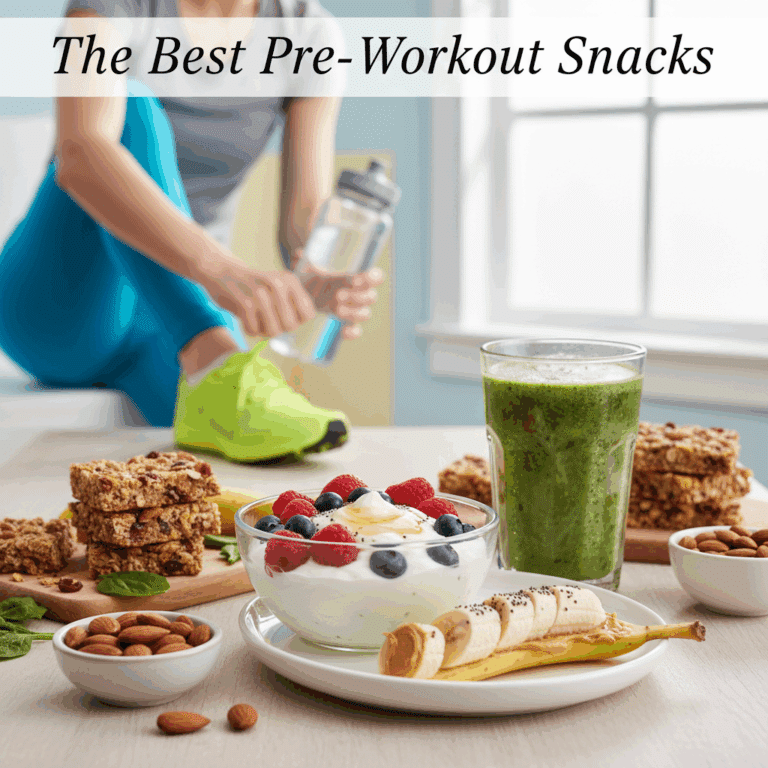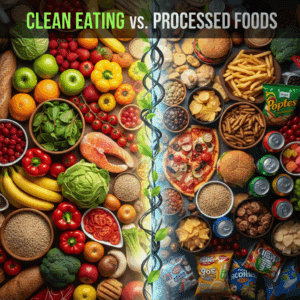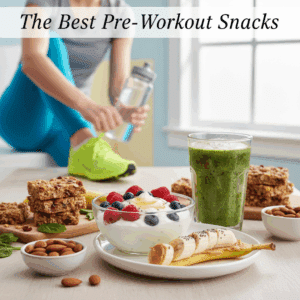Importance of Pre-Workout Nutrition
Pre-workout nutrition It is essential for fueling your body, boosting energy, and enhancing exercise performance. What you eat before training directly affects how you feel during the workout.
Choosing the right foods can provide quick, digestible energy while preventing gastrointestinal discomfort. Proper nutrition sets the foundation for effective recovery and muscle preservation.
Light snacks rich in carbohydrates and moderate protein promote sustained energy release and help maintain muscle function, critical for achieving your fitness goals.
Impact on Energy and Performance
Eating the ideal pre-workout snack helps maintain energy levels and supports endurance. Carbohydrates offer quick fuel, enhancing performance throughout training.
Including moderate protein stabilizes blood sugar and aids muscle function, allowing you to train harder and longer without fatigue.
Avoiding high sugar, fat, or fiber reduces the risk of stomach issues that can hinder focus and output during your workouts.
Role in Recovery
Pre-workout nutrition not only fuels exercise but also jumpstarts recovery by preserving muscle tissue. Protein intake before workouts supports muscle repair.
Carbohydrates help replenish muscle glycogen, preparing your body for quicker recovery after intense sessions.
Choosing the right snack promotes better regeneration, reducing soreness and improving readiness for subsequent workouts.
Ideal Nutrient Composition for Snacks
The best pre-workout snacks combine carbohydrates and moderate amounts of protein to support energy needs and muscle upkeep. This balance ensures optimal performance.
Light, easily digestible foods rich in these nutrients help prevent digestive discomfort. Avoiding heavy fats and excess fiber reduces gastrointestinal issues during exercise.
Understanding these nutrient roles empowers you to select snacks that fuel your body effectively without causing sluggishness or stomach problems.
Carbohydrates for Quick and Sustained Energy
Carbohydrates are the primary energy source during workouts, providing glucose for muscle activity. Simple carbs offer immediate fuel, while complex carbs supply sustained energy.
Eating carbs before exercise helps maintain blood sugar levels, reducing fatigue and improving endurance. Combining both fast and slow-digesting carbohydrates maximizes energy availability.
Fruits like bananas and berries, as well as oatmeal, are excellent carb sources that digest easily and prevent energy crashes during your training.
Protein for Muscle Maintenance
Including a moderate amount of protein in pre-workout snacks supports muscle preservation and repair during exercise. Protein also helps slow glucose absorption for balanced energy.
Sources such as Greek yogurt or nut butter provide essential amino acids without causing heaviness. Avoid consuming too much protein, which can overload digestion prior to workouts.
Adequate protein before training aids in reducing muscle breakdown and primes the body for faster recovery afterwards.
Foods to Avoid Before Workouts
Avoid high-fat, high-fiber, and sugary foods before workouts to prevent stomach discomfort and energy crashes. Fat and fiber slow digestion, potentially causing bloating or cramps.
Refined sugars may cause rapid energy spikes followed by drops, negatively impacting performance and focus. Heavy meals lead to sluggishness and reduce workout efficiency.
Choosing light, balanced snacks ensures you stay energized and comfortable throughout your training session.
Examples of Effective Pre-Workout Snacks
Choosing the right pre-workout snack can significantly impact your energy levels and exercise performance. Snacks that combine carbohydrates and moderate protein are ideal for lasting fuel.
Light, easy-to-digest foods such as bananas, oatmeal, and Greek yogurt provide the perfect balance of nutrients to sustain workouts without causing discomfort or sluggishness.
These snack options help maintain blood sugar, support muscle function, and aid in recovery, making them practical choices before hitting the gym or going for a run.
Banana with Peanut Butter
Banana with peanut butter is a popular pre-workout snack that offers quick-digesting carbohydrates from the banana and healthy fats plus protein from the peanut butter.
This combination ensures immediate energy release and sustained fuel, preventing energy dips during exercise. The snack is also portable and easy to prepare.
Additionally, peanut butter provides essential amino acids that support muscle maintenance, while bananas replenish glucose and potassium for muscle function.
Oatmeal with Fruits
Oatmeal combined with fruits like berries or banana offers complex carbohydrates that digest slowly, supplying sustained energy for longer or more intense workouts.
The fruits add simple sugars for quick energy boosts while enhancing flavor and nutrient content with vitamins and antioxidants.
This snack balances fiber and digestibility, so it's best consumed at least 1 to 2 hours before exercise to avoid gastrointestinal upset.
Interesting Fact
Oatmeal's slow digesting carbs help stabilize blood sugar, maintaining energy level consistency throughout your workout.
Adding fruits boosts antioxidants, protecting muscles from oxidative stress and aiding recovery.
Greek Yogurt with Fruits
Greek yogurt paired with fruits is an excellent snack providing moderate protein to aid muscle repair and carbohydrates to fuel workouts efficiently.
Its creamy texture is easy on the stomach, making it suitable for consumption 30 to 60 minutes before exercise without causing discomfort.
The fruits contribute natural sugars for quick energy, while Greek yogurt supplies calcium and probiotics that support overall digestive health.
Timing and Personalization of Pre-Workout Snacks
Timing your pre-workout snack according to the type and intensity of exercise is crucial for maximizing energy and performance. The right timing helps optimize digestion and nutrient absorption.
Personalizing snacks based on your workout and individual response ensures you avoid discomfort while receiving sustained fuel. This tailored approach supports better results and recovery.
Understanding how to adjust both timing and composition refines your nutrition strategy, allowing you to meet your body's specific demands for each workout session.
Snack Timing Before Different Workout Intensities
For high-intensity or prolonged workouts, a more substantial snack should be eaten 1.5 to 3 hours before exercise to allow digestion and energy availability. This timing helps sustain performance.
If exercising at moderate intensity or short duration, smaller snacks consumed 30 to 60 minutes beforehand provide quick energy without causing fullness. Fast-digesting carbs are ideal here.
Adjust your snack size and timing if your workout involves heavy lifting or endurance, as both have different energy and digestive needs. Proper timing reduces fatigue and enhances workout quality.
Adjusting Snacks Based on Individual Needs and Exercise Type
Every person responds differently to pre-workout foods; some may tolerate more protein, while others prefer minimal fiber. Listening to your body guides snack adjustments for comfort and energy.
Workout type influences snack choice: endurance sessions benefit from more carbohydrates, while strength training requires a balance favoring protein to support muscle function and recovery.
Personalization Tips
Experiment with small changes in snack composition and timing to discover what fuels you best. Keep a journal to track how foods affect energy and performance during workouts.
Consult nutrition professionals if unsure, as individual needs vary based on metabolism, goals, and workout demands. Customizing your pre-workout snack leads to improved results and satisfaction.






